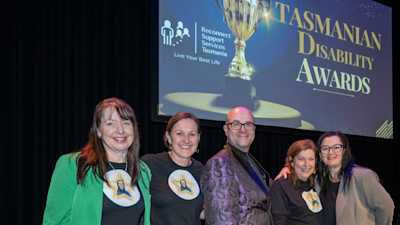Chris Chippendale at the Federal Parliament's Joint Standing Committee on the NDIS workforce enquiry.

Life Without Barriers’ submission pays particular attention to the opportunities available to, and challenges experienced by, people with disability currently employed, or wanting to be employed, within the NDIS workforce.
Chris Chippendale said that Life Without Barriers' has a long-standing commitment to providing and promoting jobs and careers for people with disability.
“While we still have a lot of work to do, we wanted to share our experience in our efforts to employ more people with disability so that the NDIA together with service providers can lead a sector wide effort to employ people with disability into frontline roles.
"People with disability in Australia still experience disproportionate barriers to employment when compared with their peers. People with disability are also under-represented in employment, have longer periods of unemployment and lower levels of job retention.
"Individuals who are denied the right to work are equally then denied the significant social and wellbeing benefits that work offers including independence, dignity, purpose and financial security."
Chris Chippendale said it is imperative that the NDIS, people with disability and service providers work together to ensure that people with disability can harness the employment opportunities that the NDIS is set to provide over coming years, particularly in in the essential workforce.
“Measures Life Without Barriers has taken include implementing Accessibility, Inclusion and Employment Plans that mandate targets for the proportion of employees with disability," he said.
"We have also worked very hard to earn and retain Disability Confident Recruiter Status from The Australian Network on Disability, which requires us to have clear recruitment information on our website that welcomes candidates with disability and that advises them of our open approach to workplace adjustments."
"This experience flows through the application, interview and onboarding process. We also seek feedback from employees with disability about their adjustment process once they were employed with the organisation."
“We are still on the journey though, and we continue to learn. For example, because of past experiences of discrimination, some people are reluctant to disclose their disability to their employer, which can make it difficult to measure disability workforce as well as provide the adjustments that people need."
“Another issue within our industry is what is called benevolence bias – because our organisation is geared towards assisting people with disability, it is easy to assume that employees with disability need help. What they need is empowerment to be recognised as colleagues and leaders."
“Overall, there remains systemic challenges to people with disability having equality of access to employment opportunities that we as a service provider cannot solve," Chris said.
The sector, governments and businesses should consider other options, such as including the purpose provisions in funding contracts or organisations working together for better employment outcomes in local communities.


